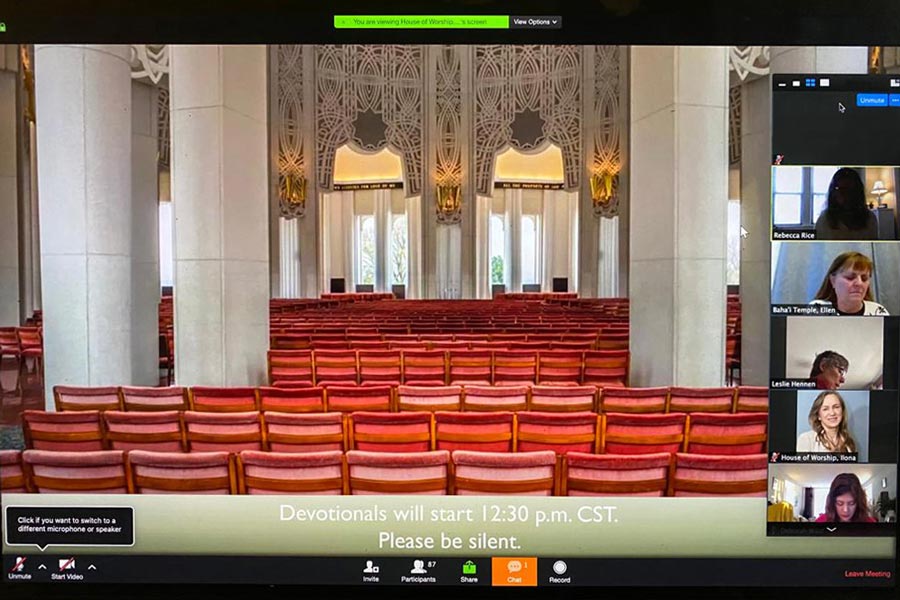In the realms of human experience, crises potentiate transformation, serving as harbingers of intellectual and spiritual awakening. The Bahá’í teachings proffer profound insights into the moral and ethical imperatives that accompany such challenges, advocating a response that encompasses both personal integrity and collective action. This article elucidates how the Bahá’í principles can inspire individuals and communities alike to rise resolutely to the occasion during tumultuous times.
As the world grapples with a plethora of unrelenting crises—be they health-related, environmental, or socio-political—an analogy arises: that of the phoenix, which transcends destruction through an alchemical process of regeneration. The Bahá’í Faith encourages its adherents to emerge from adversity as refined beings, imbued with renewed purpose and strength. This intrinsic aspiration embodies the idea that through trials, communities can cultivate virtues that resonate with universal peace and unity.
One of the cornerstone principles within Bahá’í teachings is the concept of the oneness of humanity. In a global crisis, this tenet is not merely theoretical but essential for survival. The interconnectedness of the human race serves as a powerful reminder that challenges faced by one segment of society reverberate across the entire tapestry of civilization. Such an understanding engenders a spirit of solidarity—one that transcends geographical boundaries, cultural differences, and social disparities. Individuals are called to act not in isolation but as integral parts of a cohesive whole, responding to crises with a profound sense of shared responsibility.
Equally significant is the imperative of consultation, a process that can be likened to a musical symphony. Each voice contributes to a cohesive harmony, emphasizing the importance of collaboration. In times of crisis, unilateral decision-making can lead to discord and confusion. Conversely, Bahá’í teachings advocate for open dialogue, collective problem-solving, and mutual respect. Engaging diverse perspectives fosters innovative solutions and cultivates resilience. By adopting a consultative approach, communities are better equipped to navigate the complexities of global challenges.
Moreover, the Bahá’í writings assert that individuals should cultivate a spirit of service, which is profoundly rich in its implications. Service is not merely an act of kindness; it is an existential commitment that transforms the giver and receiver alike. In times of crisis, this principle serves as a beacon, guiding action toward the welfare of others, thereby reinforcing the bonds of community. The act of serving others becomes an antidote to despair and a wellspring of joy, creating spaces where empathy can flourish amidst adversity.
Integral to the Bahá’í approach to crises is the cultivation of resilience—both at an individual and collective level. Resilience can be likened to a flexible sapling that bends yet does not break in the face of gales. This inner fortitude necessitates reliance on spiritual teachings and the development of personal virtues such as patience, perseverance, and humility. In nurturing these qualities, individuals become better equipped to withstand the tempests of life. They learn to view crises as opportunities for enhancement rather than mere impediments to progress.
Furthermore, the Bahá’í Faith emphasizes education as a pillar in mitigating crises, underscoring its transformative potential. Education empowers individuals with critical thinking skills and the ability to discern truth amid a cacophony of competing narratives. In a world inundated with information—often contradicting and misleading—education serves as a beacon of clarity. Through the lens of the Bahá’í teachings, it is evident that the advancement of society hinges on the enlightenment of its individuals. As communities fortify themselves through education, they cultivate a more informed and proactive citizenry, able to address crises with sagacity and strength.
Beyond practical strategies, the Bahá’í teachings accentuate the importance of cultivating an uplifting vision of the future, one that inspires hope amidst despair. This vision is reflective of a collective consciousness that aspires toward peace, justice, and the betterment of society. It encompasses the ideal that humanity can work synergistically to overcome barriers and frame a new paradigm in which cooperation is the norm rather than the exception. This aspirational vision not only galvanizes action but also provides a counter-narrative to the cynicism and despair that can accompany global crises.
In conclusion, the Bahá’í teachings offer invaluable guidance for rising to the occasion in a global crisis, articulating a multifaceted approach imbued with spiritual and practical dimensions. Central to this is the understanding of the oneness of humanity, the necessity of consultation, the importance of service, the cultivation of resilience, the commitment to education, and the embrace of a hopeful vision. By internalizing these principles and translating them into actionable strategies, individuals and communities can not only navigate crises but transform them into profound opportunities for growth and unity.
As the world continues to confront challenges that seem insurmountable, the Bahá’í teachings serve as a testament to the capacity of humanity to endure, evolve, and ultimately thrive. The opportunity to rise as a phoenix from the ashes of crisis lies within our grasp, awaiting our willingness to embrace the call to action. Let us respond with courage and conviction, embodying the tenets of the Bahá’í Faith to create a more just and harmonious world.
